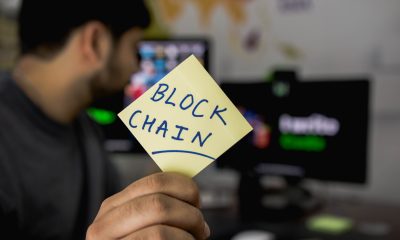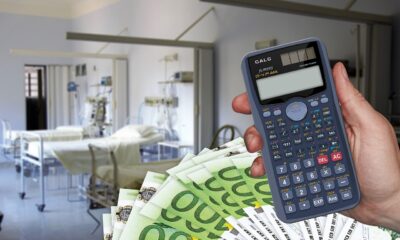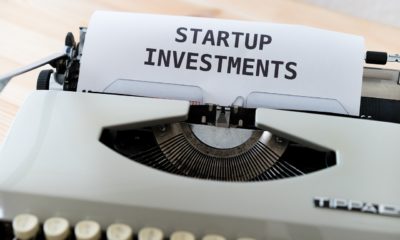Featured
Hamburg-Based Neobank Tomorrow Raises €14 Million
So far, Tomorrow has lagged behind its own goals in some respects. In the past, an interim target of 1 million customers was set – although it remained unclear how quickly this milestone was to be reached. For the moment, at any rate, the Hanseatic company is a long way from the million mark. The fintech company is now receiving $16.5 million (€14 million) to further develop.

The green bank Tomorrow has received a fair amount of criticism in recent months – for example, on the question of how sustainable its own investments are, or because of controversial advertising statements. Despite such criticism, the Hamburg-based fintech company continues to grow: Tomorrow now has 91,000 users. On balance, a good 4,000 new customers are added each month.
Respectable is now also the new financing round: Tomorrow receives $16.5 million (€14 million) for the next growth step, at a valuation of $82.4 million (€70 million). Among the investors is the Hamburg family office Abacon Capital. Up to $5.9 million (€5 million) are to come on top from crowd investors. This has already worked well once, almost exactly a year ago, private swarm investors put several million euros into the Hamburg company within a few hours. Controversial from the consumer’s point of view. Good money for the fintech company at the time.
Read more about Tomorrow and find the latest financial news in the world with the Born2Invest mobile app.
The $82.4 million (€70 million) valuation is in some ways a leap of faith
So far, Tomorrow has lagged behind its own goals in some respects. In the past, an interim target of 1 million customers was set – although it remained unclear how quickly this milestone was to be reached. For the moment, at any rate, the Hanseatic company is a long way from the million mark, even if the “100,000” mark should at least be cracked by the end of the year. “For the time being, we want to at least double every year,” says founder Jakob Berndt. An ambitious goal, if one considers that Tomorrow announced only recently to abolish the free account variant. In any case, Tomorrow does not have the growth figures of its Berlin-based competitors N26 and Vivid Money.
Another issue that has been dragged out so far is European expansion. At the beginning of last year, Tomorrow was already looking for country managers for France, Spain, Italy, Austria and the Netherlands. But then Corona came along – and the plans were postponed. Internationalization is not yet back on the agenda for 2021, says founder Berndt; but it is for 2022.
There is also the question of how “green” Tomorrow really is
At the end of 2019, Finance Forward reported that only a small portion of customer funds was invested in sustainable investments – around 1%* at the time. In the meantime, this share has risen to 13%, it now says: “Our ambition is to invest 30% in sustainable investments, we have not yet lived up to this ambition,” says Berndt – and justifies this by saying that it is “currently difficult to find the right investments.” In the past, Tomorrow had even brought higher quotas into play; the eco-magazine Utopia had heard talk of 50%.
One problem with the quota is that Tomorrow does not yet offer any investment products. This means that customers cannot invest in green assets themselves – instead, Tomorrow invests the customers’ deposits (which, however, is only possible to a limited extent). The Hamburg-based company had already announced the launch of an investment product for the second half of 2019. Now – two years later – a green equity fund is actually to be in the starting blocks, in cooperation with the Leipzig-based startup Evergreen. “We clearly distinguish ourselves from the label ‘ESG’ and have sought stricter rules for our new investment fund,” said Berndt.
So there is still no lack of goals. The necessary small change to implement it all is now in the coffers.
__
(Featured image by liggraphy via Pixabay)
DISCLAIMER: This article was written by a third party contributor and does not reflect the opinion of Born2Invest, its management, staff or its associates. Please review our disclaimer for more information.
This article may include forward-looking statements. These forward-looking statements generally are identified by the words “believe,” “project,” “estimate,” “become,” “plan,” “will,” and similar expressions. These forward-looking statements involve known and unknown risks as well as uncertainties, including those discussed in the following cautionary statements and elsewhere in this article and on this site. Although the Company may believe that its expectations are based on reasonable assumptions, the actual results that the Company may achieve may differ materially from any forward-looking statements, which reflect the opinions of the management of the Company only as of the date hereof. Additionally, please make sure to read these important disclosures.
First published in finanz-szene.de, a third-party contributor translated and adapted the article from the original. In case of discrepancy, the original will prevail.
Although we made reasonable efforts to provide accurate translations, some parts may be incorrect. Born2Invest assumes no responsibility for errors, omissions or ambiguities in the translations provided on this website. Any person or entity relying on translated content does so at their own risk. Born2Invest is not responsible for losses caused by such reliance on the accuracy or reliability of translated information. If you wish to report an error or inaccuracy in the translation, we encourage you to contact us.

-

 Crypto2 weeks ago
Crypto2 weeks agoCoinbase Surges: Bernstein Targets $510 as COIN Hits Highest Price Since IPO
-

 Biotech19 hours ago
Biotech19 hours agoBiotech Booster: €196.4M Fund to Accelerate Dutch Innovation
-

 Markets1 week ago
Markets1 week agoCoffee Prices Decline Amid Rising Supply and Mixed Harvest Outlooks
-

 Crypto5 days ago
Crypto5 days agoCaution Prevails as Bitcoin Nears All-Time High
























